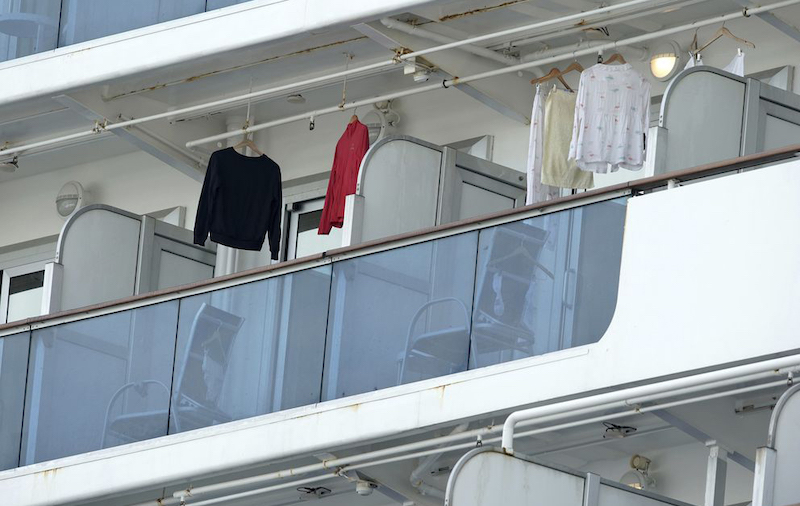Being confined to our homes for the past couple of months, most of us might admit to experiencing a bit of COVID-19 cabin fever. But imagine being confined to a tiny room aboard a cruise ship. The U.S. Center for Disease Control has said 32 American ships were affected by the coronavirus, and investigative reporting by the Miami Herald estimated that globally as many as 60 cruise ships have been affected since February, with more than 3,000 passengers sickened. One of those ships was carrying Paul Major, '78 BSc, '80 DDS, '86 PostgradDip(Dent), '88 MSc. He counts himself lucky because neither he nor his wife caught the novel coronavirus. When he finally set foot on land after five uncertain weeks at sea, home is exactly where he wanted to be. He recently spoke to Matt Rea, '13 PhD, host of the podcast The Line.
When did things start to go awry?
My wife and I were about halfway through the two-week cruise when the ports started to close and the pandemic started to shut down the world. The cruise had started in Argentina and was planned to end in Chile, but we weren't allowed to get off the boat.
So, you were stuck. What did you do?
It was quite challenging because initially the authorities in Chile weren't even going to allow the boat to resupply and refuel so it could keep travelling north. It did eventually get resupplied and refuelled, but two days after, people started getting sick on the boat.
What happened when the crew found out?
We all got quarantined to our rooms for the next two weeks. We got up as far as Panama, and at that point the illness on the boat was becoming more pronounced. So, they sent a second boat to join the first and they transferred about 800 passengers from the boat I was on, the Zaandam, to the Rotterdam.
Was it smooth sailing from there?
They finally got permission to go through the Panama Canal, which took two or three days of negotiations. And then we sailed up to Florida. Of course, there was, at that point, no approval to stop at Florida, so it was another huge challenge to get permission to actually dock the boat.
We eventually ended up in Fort Lauderdale and got off the boat. So, what started out as a 3,500-mile cruise turned into, I think, about a 10,000-mile cruise in the end, and what was supposed to be two weeks turned into five weeks.
I guess you'd have to get pretty comfortable with your travel partner, being in such close quarters for five weeks!
We were fortunate because our room had a balcony, so we were able to get outside. It was much more pleasant than the other individuals that were stuck in rooms where they couldn't even experience sunshine or fresh air. We were very well treated by the boat's staff and they fed us well and so on. It did get a bit tedious, obviously, being in a tiny room, 24/7.
Stepping off a plane or boat after a long trip is a relief under normal circumstances. It must have felt good to finally get your feet on dry land.
It was quite a production getting off the boat, quite frankly, because the port authorities in Florida kept us completely segregated from everyone else. They took us off the boat, loaded us on buses - all police-escorted to the airport. They didn't stop for traffic lights or anything! We got to the airport, and they had a chartered airplane to take the 150 Canadians that were on that cruise back to Canada. It took about three hours in Toronto to get through all the Health Canada checks and immigration things.
It must have been good to get home.
We were very thankful to step off the plane in Edmonton and actually be able to go to our own home. While in quarantine on the boat, we were given one cup of coffee with breakfast, but with the food delivery to all the rooms, the coffee was cold when we got it. So the first thing we did when we got home was to enjoy a really good cup of coffee.
What are your thoughts now, when you reflect on the situation?
The takeaway from the experience was how fear, rather than rational thought, determined the response of governments to the situation.
---
This interview has been edited for length and clarity. Listen to the full episode of The Line featuring Paul Major here.

We at New Trail welcome your comments. Robust debate and criticism are encouraged, provided it is respectful. We reserve the right to reject comments, images or links that attack ethnicity, nationality, religion, gender or sexual orientation; that include offensive language, threats, spam; are fraudulent or defamatory; infringe on copyright or trademarks; and that just generally aren’t very nice. Discussion is monitored and violation of these guidelines will result in comments being disabled.